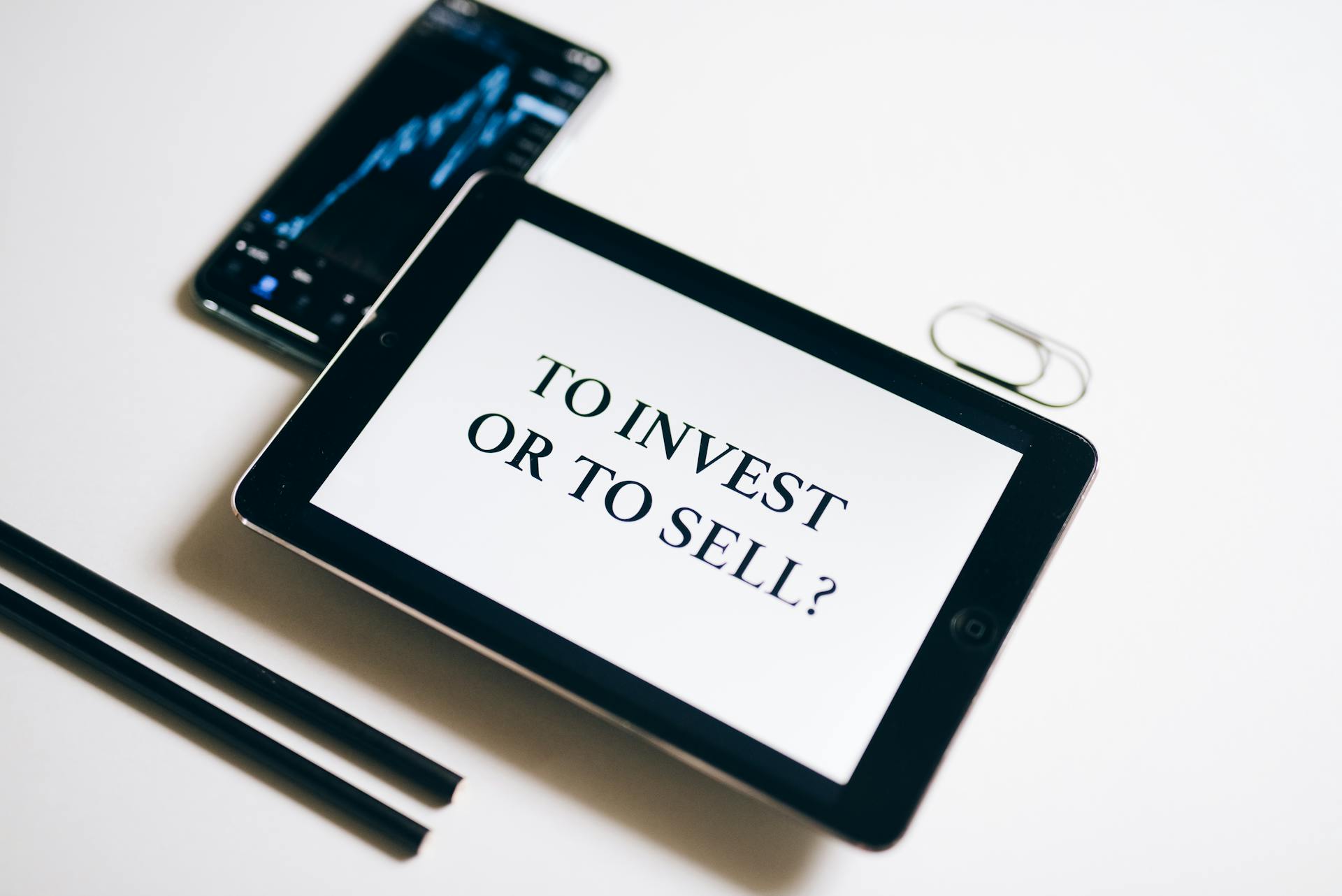
Christian ETFs offer a convenient way to invest in the market while aligning your investments with your values.
The iShares MSCI USA ESG Select ETF (ESGU) has a low expense ratio of 0.15% and tracks the performance of the MSCI USA ESG Select Index.
Many Christian investors prefer to invest in ETFs that screen out companies involved in activities that conflict with their faith, such as tobacco and firearms.
The SPDR S&P 500 Fossil Fuel Reserves Free ETF (SPYX) excludes companies with significant fossil fuel reserves, making it a popular choice for environmentally conscious investors.
Broaden your view: Ishares Msci Usa Momentum Factor Etf
Timothy Plan
Timothy Plan pioneered the first pro-life, pro-family screening standard in 1994. Their commitment to the Lord is to not invest in any company that violates their screens.
Their mission is to enable investors to combine a high rate of return with morally responsible investing. This means considering the values and principles of the companies they invest in.

Timothy Plan's ETFs have a unique approach to investing, valuing stocks based on their volatility rather than company size or production. This aligns with their goal of Godly stewardship.
Their smart beta ETFs strive to bring glory to God through biblically responsible investing. This involves using biblical filters and cutting-edge investment strategies.
The TPLC (Timothy Plan US Large/Mid Cap Core ETF) has a separate investment screening component that effectively screens securities with direct involvement in prohibited activities. However, this can be subjective and relies on the fund managers' decisions.
The TPLC fund has a high turnover rate of 26%, which is typical of actively managed funds. These funds often underperform a passive U.S. total stock market index.
Timothy Plan works in conjunction with a sub-advisor to construct the fund lineup of TPLC. The sub-advisor selects securities deemed attractive from an investing standpoint, while Timothy Plan removes securities that don't satisfy their faith-based screening criteria.
The faith-based component of TPLC excludes companies involved in the production or wholesale distribution of alcohol, tobacco, or gambling equipment. It also excludes securities whose practices can be found offensive to basic, traditional Judeo-Christian values.
Check this out: Peter S Lynch
Inspire

Inspire is an ETF that believes you should be proud of the investments you own. They focus on quality companies that not only perform well financially but also align with your values.
Inspire seeks out above average, "best in class" companies in redemptive categories. This means investing in companies that make a positive impact.
Companies with activities counter to biblical values are carefully screened out by Inspire. This ensures that your investments align with your moral compass.
As you consider Inspire, remember that they're looking for companies that excel in both financial and values-based perspectives.
Ronald Blue Trust Access Portfolios
Ronald Blue Trust Access Portfolios offer customized solutions tailored to clients' personal goals and values.
These tax-efficient portfolios are built using a technique called Direct Indexing, which allows for a more individualized approach to investing.
With Direct Indexing, portfolios can hold fewer funds and more individual stocks, providing more control over investments.
This approach also enables clients to exclude companies from their portfolios using values-based screens, if desired.
Ronald Blue Trust advisors bring a unique combination of technical expertise and biblical wisdom to help clients make wise financial decisions.
This expertise allows clients to experience clarity and confidence in their investments, as well as a lasting legacy.
Recommended read: Direct Index Investing
Knights of Columbus

The Knights of Columbus is a great option for those looking to invest with integrity. They adhere to the socially responsible investment guidelines set by the United States Conference of Catholic Bishops (USCCB).
By doing so, they ensure that client funds are invested in companies that prioritize sound ethical, environmental, social, and corporate governance practices. This approach is known as "value with values."
Biblically Responsible Investing
Biblically Responsible Investing (BRI) is an investment philosophy that aligns an investor's faith with their investments. It involves screening securities that don't fit the fund's criteria and including those that do.
BRI funds are actively managed and not immune to performance challenges, with over 90% of actively managed funds underperforming over the long-term. This is evident in the SPIVA study, which charts the performance of actively managed funds against their benchmarks.
To evaluate a BRI fund, investors should review the fund's prospectus, which describes the overall goals and objectives of the fund. This will help investors understand if the faith-based objectives are in alignment with their values. Investors should also review the fund's asset allocation, management style, performance, risk, and expense ratios.
Here's a brief overview of some popular BRI funds:
BIBL Holdings vs BRI Objectives
BIBL appears to come up short on achieving its fund's high standard of security inclusion. 7 out of the top 10 holdings (70%) have corporate initiatives in apparent conflict with the stated criteria of excluding “any company that has any degree of participation in the following activities…”.

Investors can review a company's “about us” page to find company initiatives that are in contrast with the stated exclusionary criteria. This is highlighted by Intuitive Surgical's website, which shows the difficulty of attempting to exclude securities with “any” degree of participation in non-biblical values.
Excluding companies that do not have any hint of non-biblical values is not realistic, and BIBL's holdings reflect this challenge. One of its primary revenue sources are alcoholic beverage companies, making up a relatively small percentage of the overall fund (.34%).
BIBL's holdings are a clear example of the difficulty in achieving a high standard of security inclusion. The fund's prospectus is the definitive source of its stated objectives, but it's clear that BIBL's holdings do not always align with these objectives.
Curious to learn more? Check out: Etfs with Arm Holdings
Biblically Responsible Investments Analysis
Biblically Responsible Investing (BRI) is an investment philosophy that seeks to align an investor's faith with their investments. It's a matter of personal conscience, as Paul notes in Romans 14, and each investor must decide what's "too much" for their values.
Discover more: Vanguard Index Funds S

BRI funds are actively managed, which means they face performance challenges. In fact, over 90% of actively managed funds underperform their benchmarks over the long-term, according to the SPIVA study.
Investors considering BRI funds should carefully examine each fund's prospectus, which describes the overall goals and objectives of the fund. This is the best way to understand if the faith-based objectives are in alignment with an investor's values.
BRI funds often have unique screening criteria, but determining what's "too much" sin can be subjective. For example, some funds may exclude companies involved in the production or wholesale distribution of alcohol, tobacco, or gambling equipment, while others may have a more broad set of criteria.
Here are some key points to consider when evaluating BRI funds:
- Fund performance: BRI funds are actively managed and may underperform their benchmarks over the long-term.
- Screening criteria: Each fund has its own unique set of criteria, and determining what's "too much" sin can be subjective.
- Expense ratios: BRI funds often have higher expense ratios due to their active management.
- Turnover ratios: BRI funds often have higher turnover ratios, which can create tax consequences for investors.
- Risk profile: BRI funds may have a higher risk profile due to their active management and subjective screening criteria.
Ultimately, investors must decide for themselves whether BRI funds align with their values and investment goals. It's essential to carefully evaluate each fund and consider the potential risks and rewards before making a decision.
Investment Analysis

To evaluate a Christian ETF, it's essential to review its prospectus, which can be found on the fund manager's website.
The prospectus describes the fund's overall goals and objectives, providing a baseline for comparing its holdings to stated criteria.
Investors should also review the fund's asset allocation, which is a significant contributor to its investment experience.
Understanding the fund's holdings from a market capitalization standpoint, sector, and percentage of cash can help determine the expected investment experience.
Reviewing the fund's asset allocation is crucial to understanding its investment experience.
If this caught your attention, see: Vaneck Semiconductor Etf Holdings
Fund Asset Allocation Review
The fund's asset allocation is one of the largest contributors to its investment experience. Reviewing this information can help you determine what type of investment experience to expect.
The fund's holdings from a market capitalization standpoint, sector, and percentage of cash can give you a clear picture of its asset allocation.
To evaluate a fund's asset allocation, start by reviewing the prospectus, which is the definitive source of the fund's stated objectives. This will give you a baseline for comparing the fund's holdings with its stated criteria.
Understanding the fund's asset allocation can also help you determine if the fund is delivering on its stated objectives.
Size and Trading Volume for EFTs
When investing in ETFs, it's essential to consider the size and trading volume of the fund. BIBL is a small fund compared to other popular ETFs.
A smaller fund can be more susceptible to larger orders moving the price, which can negatively impact an investor's net performance. This is because lower trading volumes can make it easier for a single large order to significantly impact the fund's price.
ETFs with smaller trading volumes may have larger price swings due to the lack of liquidity. This can result in investors paying more for their shares than they would in a more liquid market.
Investors should be aware that smaller funds can be more volatile, and this may not be suitable for all investment strategies.
Related reading: Reits in Ira Accounts
Direct Indexing
Direct Indexing is a relatively new development in portfolio management.
It allows investors to tailor an index to their specific screening criteria, essentially creating a customized set of securities.
The average cost to use direct indexing is around 0.4%.
This approach ensures that an investor's portfolio is in alignment with their values.
The more aggressive an investor is at removing certain companies and including others, the more likely they are to underperform.
You might enjoy: Direct Invest Hsbc
GuideStone Envisions a World Transformed

GuideStone Funds strives to provide competitive returns while honoring the Lord. They do this by avoiding investments in companies that produce products or provide services that inhibit the flourishing of the image of God, such as those involving abortion, sexual immorality, alcohol, tobacco, or gambling.
To influence business practices for outcomes that contribute to a transformed world, GuideStone utilizes leading proxy advisory firms and dialogues with corporate leadership. This helps steer companies toward more Christ-like practices that can benefit consumers, employees, and the communities in which they operate.
GuideStone's Impact Equity Fund and Impact Bond Fund allow them to further God's Kingdom in this world through direct investments. They invest in organizations whose products, services, and practices seek to protect the sanctity of life and promote human dignity and advancement, further the spread of the Gospel, and enhance the stewardship of God's creation.
The vision of GuideStone is a world where all believers honor the Lord with their investments and their lives. This includes Christian ministries and individuals having all they need to grow the Kingdom, and the Gospel being heard throughout the world.
Explore further: Vaneck Vectors Oil Services Etf Oih
Financial Considerations

When evaluating Christian ETFs, it's essential to consider the fees associated with each fund. Fees are a necessary part of running a fund, but they do directly reduce gross performance.
A fund with a high expense ratio can eat into your returns, leaving you with less money in the long run. For example, a fund with a gross return of 8% and an expense ratio of 1% leaves a net 7% return to the investor.
In general, lower fees correlate to higher investment returns when comparing similar funds.
Curious to learn more? Check out: When Did Etfs Start
Review the Prospectus
The prospectus is the best place to understand the objectives of a Biblically Responsible Investing (BRI) fund.
It contains the fund's characteristics, such as the securities it attempts to exclude and include, its benchmark, expenses, and more.
Investors should focus on the screening criteria section, as it's the heart of a BRI fund.
A fund's prospectus can be found on the fund manager's website.

To evaluate a fund, review its prospectus and screening criteria to see if it's delivering on its stated objectives.
BIBL uses its own proprietary screening methodology to determine which securities to include or exclude.
It seeks to exclude securities with any "degree of participation" in products or activities that don't align with biblical values.
The fund also seeks to include securities that have a track record of acting in alignment with biblical values.
ETILX screens for securities that are both fundamentally attractive and have alignment with the fund's stated screens.
The fund's language is more realistic, stating that there's no guarantee it can successfully screen out all companies inconsistent with its principles.
Timothy Plan removes securities that don't satisfy its faith-based screening criteria.
The fund excludes companies involved in the production or wholesale distribution of alcohol, tobacco, or gambling equipment.
Reviewing a fund's prospectus is crucial to understanding its faith-based objectives and evaluating if they align with your values.
Investors should also review the fund's asset allocation, management style, performance, risk, and expense ratios.
Worth a look: Etfs That Include Ldos
Tax Efficiency

Tax Efficiency is a crucial aspect to consider when investing in ETFs.
For regular investment accounts, ETFs are more tax efficient because in most instances, capital gains are not passed on to the investor.
This means you get to keep more of your hard-earned money, which is always a good thing.
Curious to learn more? Check out: Why Are Etfs Tax Efficient
Review Fund Fees
Fees are a necessary part of running a fund, but they do directly reduce gross performance.
A fund's fees, known as the expense ratio, can make a big difference in your investment returns. For example, a fund with a gross return of 8% and an expense ratio of 1% leaves a net 7% return to the investor.
Lower fees correlate to higher investment returns when comparing similar funds. This means you'll keep more of your money if you choose a fund with lower fees.
A relatively low expense ratio is a good thing, especially if it's compared to other actively managed funds. BIBL has an expense ratio of .35%, which is a significant advantage over other funds in its category.
If this caught your attention, see: Low Expense Ratio Etfs
Financial Advisor
A financial advisor can provide personalized guidance on managing your finances, creating a budget, and making smart investment decisions.
They can help you identify your financial goals and develop a plan to achieve them, whether it's saving for a down payment on a house, paying off debt, or building a retirement nest egg.
Etilx
ETILX has a more realistic approach to screening, acknowledging that no fund can guarantee perfect alignment with its stated principles.

The fund's language is more focused on principles than specific "sins", creating a broader group of possible securities to include.
This approach may allow securities to be selected that are not in alignment with an investor's values.
ETILX clearly states its screening objectives, including the possibility of selecting securities that don't perfectly align with its principles.
The fund's language is more transparent and realistic than some other Christian ETFs, which can be beneficial for investors who value honesty.
Frequently Asked Questions
What is the Christian stock index?
The Christian stock index, also known as the CHV Index, tracks the performance of large U.S. companies that align with Christian values by excluding industries like gambling and tobacco. This index provides a unique investment option for those seeking to align their finances with their faith.
Sources
- https://www.faithdriveninvestor.org/mutual-funds
- https://timothyplan.com/our-etfs/home.php
- https://www.guidestonefunds.com/Faith-Based-Investing
- https://paxfinancialgroup.com/biblically-responsible-investing/
- https://churchfiduciary.com/biblically-responsible-investing-a-comprehensive-guide-and-fund-analysis/
Featured Images: pexels.com


